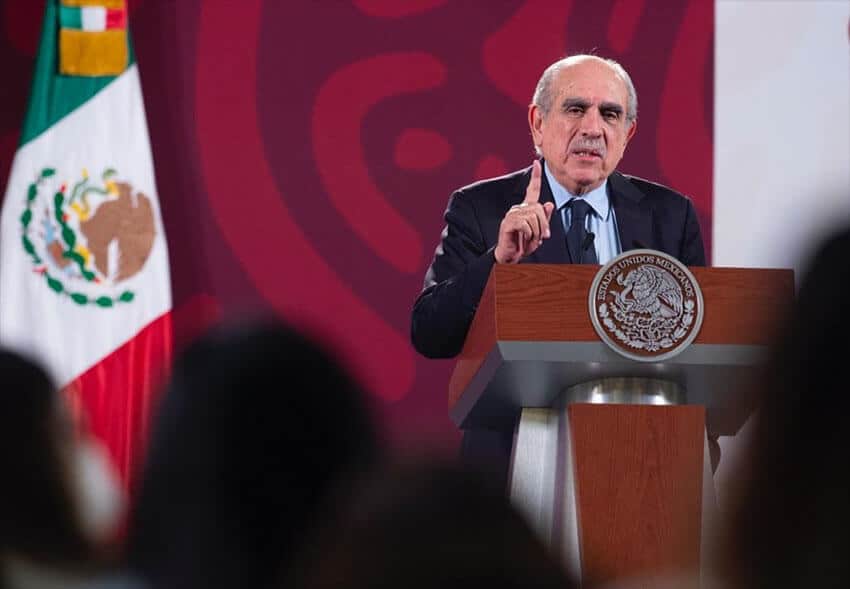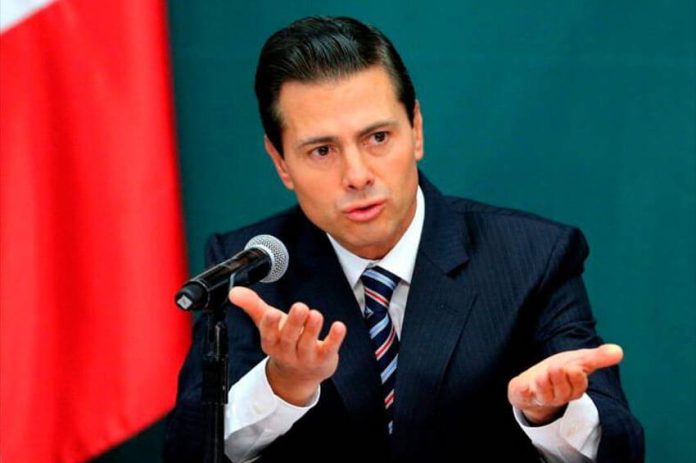Former president Enrique Peña Nieto has defended the legality of his wealth after the federal government revealed it had asked the Attorney General’s Office (FGR) to investigate money transfers and companies from which he allegedly benefited.
At President López Obrador’s press conference last Thursday, the head of the Financial Intelligence Unit (UIF) said there was evidence that Peña Nieto – who was in office between 2012 and 2018 – received 26 million pesos (US $1.25 million at today’s exchange rate) in transfers between 2019 and 2021.
Pablo Gómez Álvarez said that a sister of the former president transferred the funds from an account in Mexico to Spain, where Peña Nieto now lives. He said that she also sent checks for 29 million pesos to Peña Nieto’s brother.
“The blood relative made withdrawals for 189.85 million pesos and deposits for 74.52 million pesos between 2013 and 2022. … The deposits are relevant given that, as cash operations, the source is unknown,” Gómez said.
Among other questionable dealings, Gómez said the UIF detected that Peña Nieto has links to two companies with “fiscal and financial irregularities.”
The official said that the former president was a shareholder in one company – “company A” – that transferred large amounts of money. “It’s a family company that existed before the former president became president,” Gómez said.
He said that the other company – “company B” – was formed by Peña Nieto and family members prior to 2012. “It has a symbiotic relationship with a multinational company that benefited from federal government contracts during the administration of the then head of the executive,” Gómez said.
The UIF chief added that company B – a manufacturer of plastics and disposable medical materials – has been identified as a government supplier and provider of services, and won contracts worth a total of 10.53 billion pesos (US $508 million at today’s exchange rate) during Peña Nieto’s administration. Between 2015 and 2021, it transferred large quantities of money – over 1.5 billion pesos – to the United States, Ireland and the United Kingdom, Gómez said.

“The complete information with all the details has been delivered to the federal Attorney General’s Office and the FGR has opened an investigative file. The FGR will do the investigation and the Financial Intelligence Unit will provide everything it needs,” he said.
“The UIF is never in charge of investigations,” Gómez stressed, distancing the government from the prosecution of the case. “The UIF simply collects information in accordance with the law, analyzes it and delivers it” to other authorities, he said.
Gómez rejected any suggestion that the case was politically motivated. “There is not a policy of persecution for purely political reasons,” he said.
Asked what crimes Peña Nieto was accused of, the UIF chief said that was up to the FGR to determine. “That’s part of its constitutional function at the time of prosecuting a case. … While there’s no prosecution of a case, there’s no crime,” Gómez said.
The UIF chief’s remarks brought Peña Nieto out of a five-month-long social media hibernation, with the ex-president writing on Twitter that he was certain he would be given the opportunity to clear up “any questioning” about his wealth and prove its legality. “I express my confidence in the institutions … of justice,” he added.
José Antonio Crespo, a political scientist, described the case against Peña Nieto as “political,” but predicted nothing will come of it.
“Once again it’s a political use of justice, of the law, that’s why it’s coming out now,” he told the newspaper El Universal.
Crespo said he believed that the government was seeking to pressure Peña Nieto to use his significant influence in his native México state to help the ruling Morena party win the 2023 gubernatorial election. He said it appeared that the government wants the ex-president – a former governor of México state – to ask the Institutional Revolutionary Party and the current México state Governor Alfredo del Mazo Maza (a cousin of Peña Nieto) to help Morena.
“The president will use everything necessary to win the entity due to its political and economic importance,” Crespo said, noting also that the 2023 election is a forerunner to the 2024 presidential election.
He predicted that neither the UIF nor the FGR will investigate Peña Nieto thoroughly, describing the case against him as a “smokescreen.”
Crespo said that the apparent charges the ex-president faces are minor compared to the multi-billion-peso “Master Fraud” embezzlement scheme and Pemex’s 2013 purchase at a vastly inflated price of what has been described as a “junk” fertilizer plant. Former cabinet minister Rosario Robles is in prison in connection with the former case, while ex-Pemex CEO Emilio Lozoya is in jail in relation to the latter.
Crespo said the government could enlist Peña Nieto’s support in México state within the framework of an impunity pact the former president allegedly reached with his successor. If Peña Nieto agrees to help Morena, law enforcement institutions could subsequently say that they found nothing against him, the political scientist said.
José Perdomo, a legal academic at the La Salle University, described Gómez’s airing of the Peña Nieto case as an act of an “eminently political nature” and warned that it could become a “media circus.”
He said it was clear there was an impunity pact between López Obrador and his predecessor, and suggested that the former president’s questionable conduct was revealed last Thursday to divert attention from the country’s serious problems, such as violence and inflation.
With reports from Reforma, Milenio and El Universal
